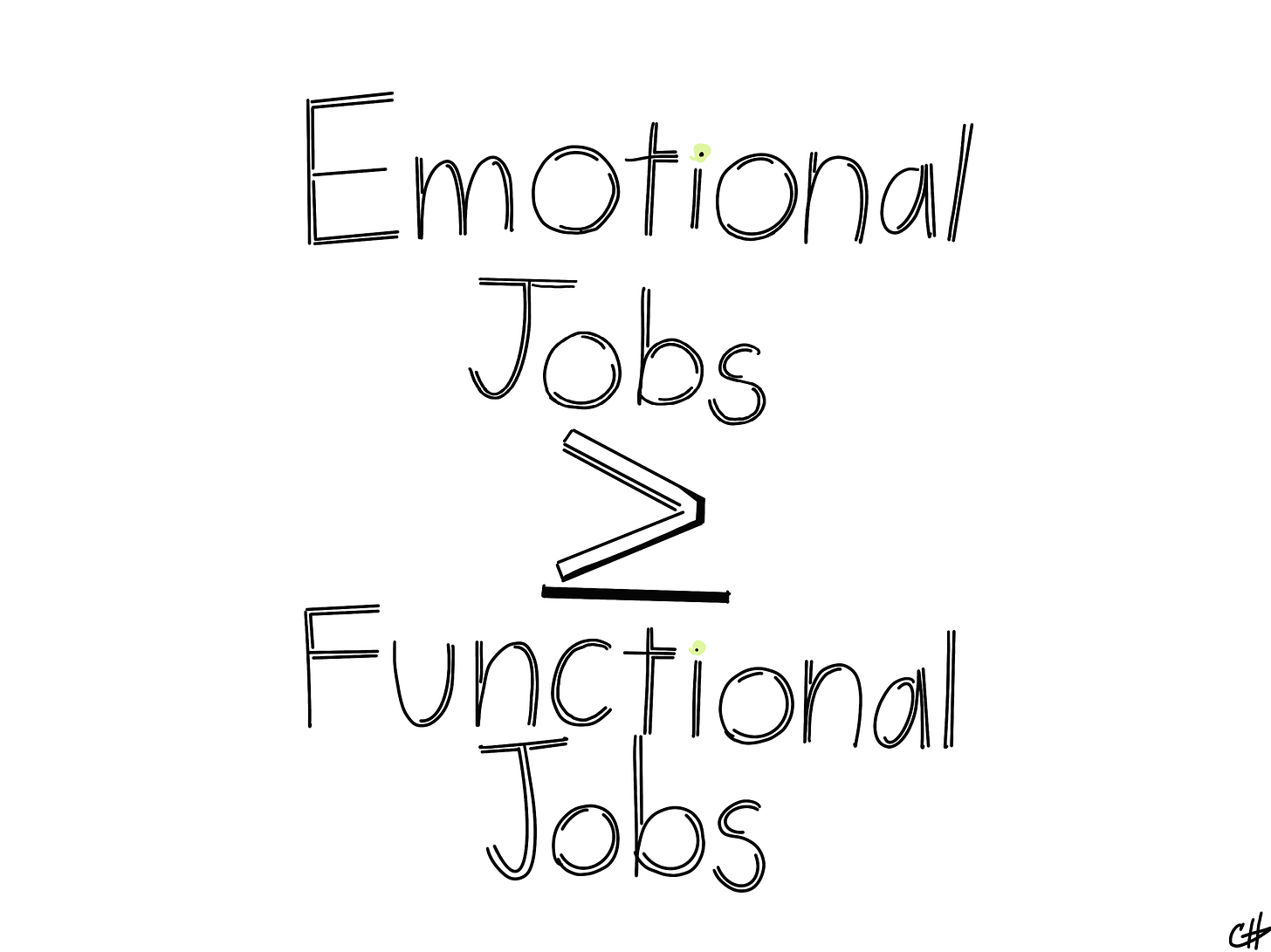Summary: Most clients prioritize emotional jobs over functional jobs at the point of sale and during the lifetime of a relationship. The most successful financial advisors distinguish between functional and emotional jobs and properly prioritize those interactions with clients. Learning to service the emotional jobs well supports higher fees, differentiation, operational efficiencies, and long-term client retention.
Last week, I recommended describing your services as something more than “financial planning.” I suggested you identify and construct clear “job statements” to expose your value more transparently to your clients.
This week we’re going to chat about a type of job that clients value even more than the functional jobs we do for them: emotional jobs.
What’s An Emotional Job?
Initially, prospects and clients might show up on your doorstep asking you to perform a functional job for them. For example, at Dentist Advisors, a prospect may ask for help to reduce their personal, student, and practice debt (a functional job, which in keeping with last week’s post, I might call “reduce debt responsibly”).
If they hire us, is it because we can do the “debt job” for them? Will they sign a client agreement simply because we offer a particular service type (functional job)? In some cases, yes, especially if their pain around that job is acute. And if our positioning is particularly niche-focused (partially an emotional job).
But in my experience, the underlying driver that causes someone to get over the edge, hire us, and continue to work with us year after year is not because we just do functional jobs…
…it’s because we perform emotional jobs.

Gif by my son Gabe Harper, Age 13.
If they hire us, it’s usually due to an underlying emotional job that was missing from their life, and they felt like we could do that in addition to helping them with the “debt job.”
I ask our clients many questions about why they hire us or continue to work with us. These are some examples of answers they commonly give:
“Because you guys specialized in working with dentists, I just felt like I could….”
“I was just feeling super unorganized with all my financial stuff and…”
“When I talked to [Amanda, Will, etc.], I felt like she understood exactly what…”
“I saw all this money piling up in my checking account and felt worried I was wasting…”
If we were to write down the above client statements into emotional job descriptions for internal use using our method from last week, we might say:
Feel more confident with financial decisions in the context of my profession
Feel more organized with my entire financial picture.
Feel understood by an experienced financial advisor.
Reduce my financial stress due to high cash.
As you can see in the examples above, the word “feel” is one of the best indicators of an emotional job a client is trying to address. The client wants to feel something in the future they don’t feel right now.

Clients who are looking for professional guidance are inherently uncomfortable with their own ability to make decisions. You are helping them to address this emotion: their discomfort.
If your client or prospect was simply trying to get functional jobs done, there are dozens of ways they can do that without talking to you. You add immeasurable value to specific types of clients by adeptly addressing the emotional jobs they most likely hired you for.
To be more precise, I’m not saying all clients are hiring advisors exclusively for emotional jobs. They probably don’t even realize that’s why they are making the buying decision. And it’s not like the emotional jobs are entirely separate from the functional ones in the way clients describe them. In my example above, to service a clients’ emotional job of worry/overwhelm/confidence, we’ll have to organize their financial picture holistically (functional), deliver a financial advisor that’s a good match (functional), and invest the idle cash and get it moving (functional). Clearly, functional jobs are still very important.
However, if we spend all of our time emphasizing, marketing, and messaging the functional jobs, we risk underdelivering—or failing to recognize altogether—the critical emotional jobs underlying our clients’ needs and motivations.
Emotional jobs are also the hardest to commoditize. Advisors who know how to expertly serve emotional jobs can charge a lot more than those who don’t. Although emotional jobs are mostly serviced through oral and written communication, they are also served through visual mediums in marketing, positioning, planning process, PR, and day-to-day service interactions with firm employees.
When you service the emotional jobs well, your relationship deepens, and you will have a better chance at improving client outcomes and adjusting client behaviors over time.
Fortunately, it’s easy to start servicing emotional jobs if you’re not already doing so. It just takes some curiosity to start. So be curious, ask the extra question, fall in love with “why?” Interview your customers and start to understand the emotional jobs that are key to enhancing each relationship and driving the best results—both for your firm’s bottom line and the future of your client’s financial wellness.
Subscribe to Reese Harper’s Substack here!

